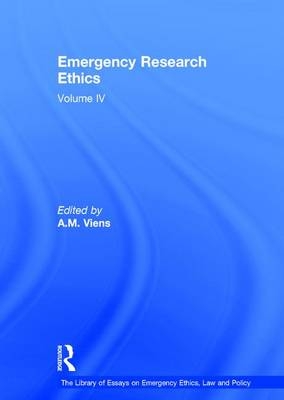
Emergency Research Ethics
Routledge (Verlag)
978-1-4094-4681-1 (ISBN)
The essays selected for this volume focus on issues that arise when attempting to design, review and undertake research involving human participants who are experiencing a private or public emergency. The main themes discussed by the essays are: the distinctive and significant ethical questions as to how research participants can be treated during emergency settings; the ethical challenges raised by emergencies for researchers undertaking research and its effects on the nature of research pursued; and procedural obstacles raised by emergencies which can affect the quality of good research ethics review. The volume is unique in that it is the first collection to exclusively deal with all of the central ethical aspects of conducting human subject research in the context of emergency.
A.M. Viens is a Research Fellow in the Institute for Medical Ethics and History of Medicine, Ruhr-University Bochum, Germany and an external member of the UCL Institute for Risk & Disaster Reduction, United Kingdom.
Contents: Introduction; Part I Consent: Informed consent in emergency research: a contradiction in terms, Malcolm G. Booth; Decision-making capacity and disaster research, Donald L. Rosenstein; To be or not to be: waiving informed consent in emergency research, Charles R. McCarthy; Waived consent for emergency research, Norman Fost; Deferred consent in emergency intensive care research: what if the patient dies early? Use the data or not?, T.C. Jansen, E.J.O. Kompanje, C. Druml, D.K. Menon, C.J. Wiedermann and J. Bakker; Ethical considerations on consent procedures for emergency research in severe and moderate traumatic brain injury, E.J.O. Kompanje, A.I.R. Maas, M.T. Hilhorst, F.J.A. Slieker and G.M. Teasdale. Part II Emergency and Critical Care Medicine: Balancing ethical principles in emergency medicine research, Eugenijus Gefenas; Has emergency medicine research benefited patients? An ethical question, Kenneth V. Iserson; Ethical and legal issues in emergency research: barriers to conducting prospective randomized trials in an emergency setting, C. Anne Morrison, Irwin B. Horwitz and Matthew M. Carrick; Ethics and research in critical care, Henry J. Silverman and Francois Lemaire; Lessons from everyday lives: a moral justification for acute care research, Andrew D. McRae and Charles Weijer; The ethical analysis of risk in intensive care unit research, Charles Weijer. Part III Vulnerable Populations: The concept of vulnerability in disaster research, Carol Levine; Vulnerable populations in emergency medicine research, Tammie Quest and Catherine A. Marco; Ethical issues in research involving victims of terror, Alan R. Fleischman and Emily B. Wood; Ethical issues pertaining to research in the aftermath of disaster, Lauren K. Collogan, Farris Tuma, Regina Dolan-Sewell, Susan Borja and Alan R. Fleischman; A second tsunami? The ethics of coming into communities following disaster, Theresia Citraningtyas, Elspeth MacDonald and Helen Herrman. Part IV Public Consultation
| Erscheint lt. Verlag | 17.1.2013 |
|---|---|
| Reihe/Serie | The Library of Essays on Emergency Ethics, Law and Policy |
| Verlagsort | London |
| Sprache | englisch |
| Maße | 174 x 246 mm |
| Gewicht | 1247 g |
| Themenwelt | Sachbuch/Ratgeber ► Gesundheit / Leben / Psychologie |
| Geisteswissenschaften ► Philosophie ► Ethik | |
| Recht / Steuern ► Allgemeines / Lexika | |
| Recht / Steuern ► Arbeits- / Sozialrecht ► Sozialrecht | |
| Recht / Steuern ► EU / Internationales Recht | |
| Sozialwissenschaften ► Politik / Verwaltung | |
| ISBN-10 | 1-4094-4681-6 / 1409446816 |
| ISBN-13 | 978-1-4094-4681-1 / 9781409446811 |
| Zustand | Neuware |
| Informationen gemäß Produktsicherheitsverordnung (GPSR) | |
| Haben Sie eine Frage zum Produkt? |
aus dem Bereich


